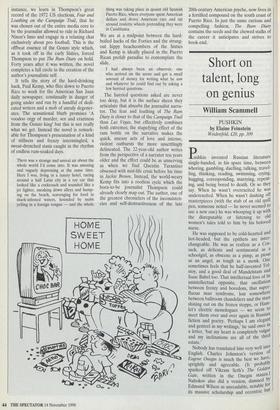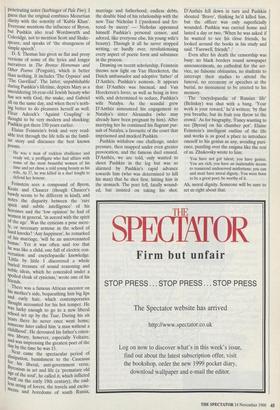Short on talent, long on genius
William Scammell
PUSHKIN by Elaine Feinstein Weidenfeld, £20, pp. 309 Pushkin invented Russian literature single-handed, in his spare time, between whoring, gambling, duelling, talking, travel- ling, thinking, reading, swimming, crying, hugging, corresponding, marrying, repent- ing, and being bored to death. Or so they say. When he wasn't overexcited he was underexcited. When he wasn't dashing off masterpieces (with the stub of an old quill pen, someone noted — he never seemed to use a new one) he was whooping it up with the disreputable or listening to old women's tales told to him by his beloved nurse.
He was supposed to be cold-hearted and hot-headed, but the epithets are inter- changeable. He was as restless as a Cos- sack, as delicate and sentimental as a schoolgirl, as obscene as a pimp, as pious as an angel, as tough as a monk. One sometimes feels that he half-invented Tol- stoy, and a good deal of Mandelstam and Isaac Babel too. That intellectual love of its unintellectual opposite, that oscillation between frenzy and boredom, that super- fluous man syndrome, lost somewhere between ballroom chandeliers and the stars shining out on the frozen steppe, or Ham- let's electric monologues — we seem to meet them over and over again in Russian fiction and poetry. 'Perhaps I am elegant and genteel in my writings,' he said once in a letter, 'but my heart is completely vulgar and my inclinations are all of the third estate.'
Nobody has translated him very well into English. Charles Johnston's version of Eugene Onegin is much the best we have, sprightly and agreeable. (It probably sparked off Vikram Seth's The Golden Gate, written in the Onegin stanza.) Nabokov also did a version, damned by Edmund Wilson as unreadable, notable for its massive scholarship and eccentric but penetrating notes (harbinger of Pale Fire). I guess that the original combines Mozartian clarity with the sonority of `Kubla Khan'. Everyone mentions the influence of Byron, but Pushkin also read Wordsworth and Coleridge, not to mention Scott and Shake- speare, and speaks of 'the strangeness of simple speech'.
D. S. Thomas has given us flat and prosy versions of some of the lyrics and longer narratives in The Bronze Horseman and Other Poems (Penguin), which is better than nothing. It includes 'The Gypsies' and The Gavriliad'. The latter, unpublishable during Pushkin's lifetime, depicts Mary as a smouldering 16-year-old Jewish beauty who has sex with God, the snake, and Gabriel all on the same day, and when there's noth- ing better to do pleasures herself as well. Fleur Adcock's 'Against Coupling' is thought to be very modern and shocking; Pushkin got there 150 years earlier. Elaine Feinstein's brisk and very read- able trot through the life tells us the famil- iar story and discusses the best known poems.
He was a man of reckless ebullience and ready wit, a profligate who had affairs with some of the most beautiful women of his time and yet chose a cold young beauty as his Wife. At 37, he was killed in a duel fought to defend her honour.
Feinstein sees a compound of Byron, Keats and Chaucer (though Chaucer's bawdy seems to be different in kind), and notes the disparity between the 'rare spirit and subtle intelligence' of his heroines and the 'low opinion' he had of women in general, 'in accord with the spirit of the age'. Was the cynicism a pose mere- 'Y, or necessary armour in the school of hard knocks? 'Any happiness', he remarked of his marriage, 'will be an uncovenanted bonus.' Yet it was often said too that he was like a child, one full of electric con- y, ersation and encyclopaedic knowledge. Little by little I discovered a whole buried treasure of sound reasoning and noble ideas, which he concealed under a spoiled cloak of cynicism,' wrote one of his friends.
There was a famous African ancestor on his mother's side, bequeathing him big lips and curly hair, which contemporaries thought accounted for his hot temper. He was lucky enough to go to a new liberal school set up by the Tsar. During his six Years there he never once went home; someone later called him 'a man without a childhood'. He devoured his father's exten- sive library, however, especially Voltaire. and was impressing the greatest poet of the clay by the time he was 15.
dissipation, came the spectacular period of tssipation, banishment to the Caucasus for his liberal, anti-government verse, 13 Yrentsin in art and life (a 'premature old age of the soul', he called it, which inflicted itself on the early 19th century), the end- less string of lovers, the travels and excite- ments and boredoms of south Russia. marriage and fatherhood, endless debts, the double bind of his relationship with the new Tsar Nicholas I (`pardoned and fet- tered by mercy' — Nicholas appointed himself Pushkin's personal censor, and adored, like everyone else, his young wife's beauty). Through it all he never stopped writing, or hardly ever, revolutionising every aspect of poetic form and substance in the process.
Drawing on recent scholarship, Feinstein throws new light on Van Heeckeren, the Dutch ambassador and adoptive 'father' of D'Anthes, Pushkin's nemesis. It appears that D'Anthes was bisexual, and Van Heeckeren's lover, as well as being in love with, and determined to seduce, Pushkin's wife Natalya. As the scandal grew D'Anthes announced his engagement to Natalya's sister Alexandra (who may already have been pregnant by him). After marrying her he continued his flagrant pur- suit of Natalya, a favourite of the court that imprisoned and mocked Pushkin.
Pushkin withdrew one challenge, under pressure, then snapped under even greater provocation, and the famous duel ensued. D'Anthes, we are told, only wanted to shoot Pushkin in the leg but was so alarmed by Pushkin's rapid advance towards him (who was determined to kill his man) that he shot first, hitting him in the stomach. The poet fell, fatally wound- ed, but insisted on taking his shot. D'Anthes fell down in turn and Pushkin shouted 'Bravo', thinking he'd killed him, but the officer was only superficially wounded. Pushkin was carried home and lasted a day or two. 'When he was asked if he wanted to see his close friends, he looked around the books in his study and said. "Farewell, friends" .'
Even after his death the censorship was busy: no black borders round newspaper announcements, no cathedral for the ser- vice, no fulsome obituaries, no students to interrupt their studies to attend the funeral, no ceremony or speeches at the burial, no monument to be erected to his memory.
The 'encyclopaedia of Russian life' (Belinksy) was shut with a bang. 'Your work is your reward,' he'd written; 'by that you breathe, but its fruit you throw to the crowd.' As for biography, 'Fancy wanting to see [Byron] on his chamber pot'. Elaine Feinstein's intelligent outline of the life and works is as good a place to introduce oneself to his genius as any, avoiding puri- ence, puzzling over the enigma like the rest of us. Zhukovsky wrote to him:
You have not got talent; you have genius. You are rich, you have an inalienable means to transcend undeserved misfortune; you can and must have moral dignity. You were born to be a great poet; be worthy of it.
Ah, moral dignity. Someone will be sure to set us right about that.



















































































 Previous page
Previous page